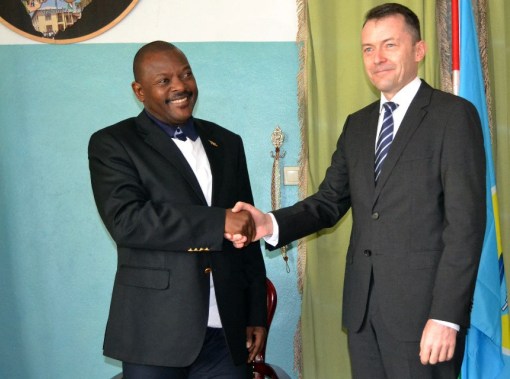United Nations chairperson for Burundi Peace Building Commission (PBC) Jurg Lauber has observed that the country has made lively impression and the general security situation is very calm
He made the revelation in his report to the UN assembly after a three day visit- March 27- 30, 2018, in Burundi.
This was Lauber’s sixth visit to the African country since his appointment and while in Burundi Capital, Bujumbura, he focused on the subjects that he had presented to the UN on 29 January which include the EAC-led dialogue process, the path towards the elections in 2020, the socioeconomic situation, the humanitarian challenges as well as reconciliation.
He stresses that the main objectives of his recent visit were to get a first-hand impression of the situation on the ground, to maintain the contact with the Government and other national stakeholders, to advocate for renewed dialogue and cooperation between the Government and its international partners and to identify further avenues for PBC engagement with Burundi.
In Burundi, he was received by President Pierre Nkurunziza, Burundi and several high-ranking government officials.
Stability
In his assessment after conducting a series of meetings with numerous stakeholders in the land, Lauber observed that there is a huge improvement in security and the situation seemed very calm.
“After three days in Bujumbura I spent one day in the city of Ngozi where I was received by the President of the Republic. The two cities which I visited during my mission to Burundi made a lively impression and the general security situation seemed calm,” writes Lauber.
Adding that, “on 28 March, I met the National Independent Electoral Commission (CENI), which is in charge of preparing the upcoming referendum and the elections of 2020. The President of the CENI explained how the Commission is finalizing registration of voters for the referendum scheduled for 17 May and the elections of 2020.”
The Nkurunziza Administration reassured Lauber of their commitment to the proposed constitutional amendments are fully compatible with the Arusha Peace and Reconciliation Agreement.
“In my contacts with the Government, I underlined that the referendum must take place in a democratic and open environment, and without any incidents. I also invited the Government to reflect about whether Burundi may require international electoral assistance for the elections of 2020,” he adds.
While discussing with Nkurunziza, Lauber emphasized that the PBC Burundi Configuration remains committed to facilitate dialogue and cooperation between the Government and its international partners.
“In that regard, I suggested to organize another round of socioeconomic consultations in Bujumbura in 2018 which could involve additional partners such as the IMF, the EU and bilateral donors.”
President Nkurunziza thanked the Configuration for its continued cooperation with Burundi and expressed his interest in another round of the socioeconomic dialogue, including with additional partners. He also indicated that the National Development Plan will be “realistic and pragmatic”.
During Lauber’s stay in Burundi, high-ranking officials from Burundi, Tanzania and UNHCR signed a tripartite agreement on the return of additional Burundian refugees from Tanzania.
According to UNHCR, a total of 274’455 Burundian refugees are currently living in Tanzania.
Priority for repatriation will be given to 19’148 refugees whose registered intention to return has already been verified by UNHCR.
The total number of returnees might reach 72’000 persons in 2018.
Lauber was pleased to hear that the UN Peace Building Fund pledged up to $ 8 million for peace building programming in Burundi this year.
Recommendations
Based on his conversations in Burundi, Lauber’s recommendations to the PBC Burundi Configuration are the following:
1) The international community should continue to follow developments in Burundi attentively and take all aspects of the current situation into account. In doing so, there is a need for coherence among UN actors and the international community, and for finding common ground with the government in order to build trust and a better sense of partnership.
2) The mediation efforts by the EAC continue to deserve our full support.
3) The next National Development Plan may offer a basis for a renewed conversation between the Government and its international partners. I am therefore planning to organize another round of the socioeconomic dialogue between Burundi and its partners in 2018 in cooperation with the Government of Burundi and the UN Resident Coordinator. The involvement of partners such as the IMF, the EU and bilateral donors who had not participated in the Bujumbura roundtables in 2017 seems crucial to me. In my view, such a dialogue session has a considerable potential to foster confidence between Burundi and its partners.
4) Besides mid- and long-term socioeconomic cooperation, the international community should not neglect the immediate humanitarian needs in Burundi. The Configuration should continue to encourage cooperation between the Government and its humanitarian partners with a view to address the most urgent needs of the population.
5) The significant gains achieved through the Arusha Peace and Reconciliation Agreement must not be undermined.
One of the advantages of a roadmap to 2020 (“feuille de route”) among political actors is that it could potentially yield a broadly shared understanding on how the gains of Arusha can be preserved – namely in the view of the elections of 2020.
6) The international community should continue to support efforts of national reconciliation and follow the ongoing reconciliation process in Burundi attentively.
